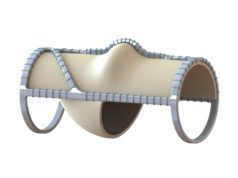Vesper Medical recently announced the completion of enrolment in its pivotal study—VIVID (Venous stent for the iliofemoral vein investigational clinical trial using the Vesper Duo venous stent system).
VIVID enrolled its 160th patient earlier this month, marking completion of enrolment in the trial. VIVID is a prospective, multicentre, single-arm study to evaluate the safety and efficacy of the Vesper Duo stent system in the treatment of patients with iliofemoral occlusive disease.
The Vesper Duo stent system is designed to be the next generation venous stent technology, uniquely engineered to address the challenges of deep vein obstruction, a press release details. The modular portfolio is intended to provide physicians clinical versatility with both the Duo-Hybrid and Duo-Extend stent options in a full range of lengths and diameters to customise therapy for each patient depending on their specific disease location within the iliofemoral vein.
“I would like to thank all of the investigators and their teams for the commitment, skill and hard work they brought to the VIVID trial. This has been a tremendous team effort that will ultimately benefit the millions of patients who suffer today with chronic venous insufficiency [CVI],” said Mahmood Razavi, director of Clinical Trials at St Joseph Heart and Vascular Center in Orange, USA and principal study investigator.
“The rapid enrolment of the VIVID trial is a testimonial to the magnitude and severity of CVI and the dedication of our investigators and employees. We are thrilled to take this important step toward bringing the novelDuo-Hybrid and Duo-Extend venous stent technology to patients suffering with CVI,” said Bruce J Shook, president and CEO of Vesper Medical.
The VIVID trial is a global study designed to enrol 160 patients at centres in the USA and Europe. It will assess freedom from major adverse events at 30 days post-procedure and primary efficacy of the stented segment at 12 months. Patients enrolled in the study will be followed for three years.









